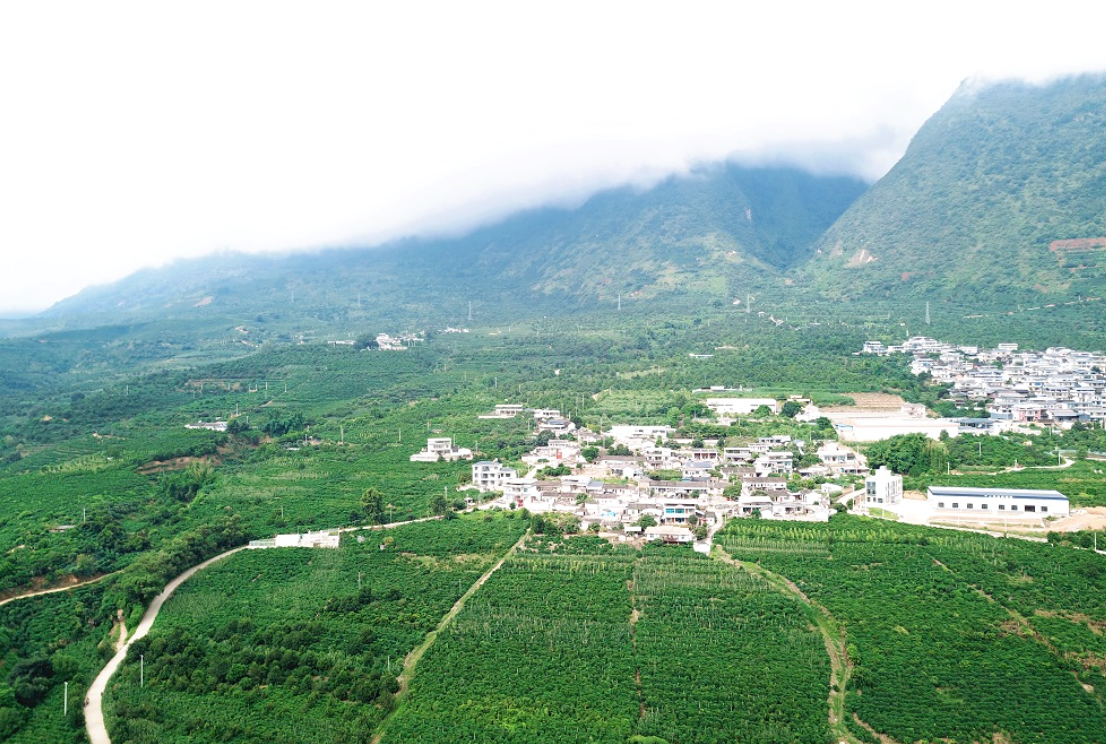China-South Asia: Journalists in search of Yunnan’s coffee aroma
The authors of this article, Prakash Bikram Shan and Gyanendra Khadkha, are respectively the editor of the Anumodan National Daily of Nepal and the coordinator with nepalkhabar.com. They have attended a training course on Coffee Planting and Processing Technology for Developing Countries in Yunnan. During their visit to Xinzhai Village in Baoshan City, they gained a new understanding of Yunnan’s coffee.

A coffee-growing area in west Yunnan's Baoshan city
Early in the morning, sunlight penetrated the clouds and sprinkled on Xinzhai Village along the Nujiang River, turning the more than 6,000 hectares of continuous coffee trees a golden color. This village, located in the Lujiangba area of Lujiang Township, Longyang District, Baoshan City, with an average elevation of nearly 1,000 meters, is the incorporated village with the largest coffee cultivation area in China.
Wang Jiawei, the Party secretary, greeted us at the village entrance. As the architect of Xinzhai Village’s development and the leader of its coffee industry, Wang is affectionately referred to as the “coffee secretary” by local coffee farmers. According to Wang, the Lujiangba area, where Xinzhai Village is located, is the origin of Baoshan small-grain coffee with a history of half a century cultivating coffee. Thanks to the abundant sunlight and the typical dry and hot river valley climate, the small-grain coffee produced here is strong but not bitter, aromatic but not pungent, and features a slightly fruity tart taste, thus enjoying a good reputation internationally.
In the coffee plantation of Xinzhai Village, once a poverty-stricken village, the coffee trees are lush, and the farmers are busy working. In the simple yet exquisite coffee manor halfway up the mountainside, many tourists have come for sightseeing. The village’s asphalt roads, which reach every household, are clean and smooth. This immediately reminded us of many Nepali villages with similar topography to Xinzhai that are becoming deserted due to population loss. With strong curiosity about the transformation of Xinzhai Village, we ventured deeper into the village to explore its development path.
Xinzhai Village has been enhancing the selection of coffee varieties and improving seedling cultivation, widely applying intelligent agricultural technology to elevate the level of coffee farming. The village has established digital infrastructure to cover its alpine coffee fields with 5G signals, enabling farmers to move their live broadcasting rooms from indoors to the mountains, thereby boosting coffee sales. With the coffee economy and rural tourism advancing side by side, the profound coffee culture and the rich aroma of hand-brewed coffee in the village’s coffee experience pavilion make visitors linger.
In our opinion, Xinzhai Village, which has broadened its path to prosperity through the transformation of the coffee industry, is a microcosm of the comprehensive revitalization of China’s countryside. Over the years, we have visited many places in China and witnessed numerous beautiful examples of rural revitalization. China’s experience in this aspect provides valuable references for the development of Nepali villages. In the future, we plan to visit more villages in China and bring the knowledge we gain back to Nepal, in hopes of helping more Nepali farmers achieve happy and prosperous lives.
Read more:
Yunnan is China’s largest coffee-growing province, producing over 98 percent of the country’s coffee. The main coffee production areas in the province are located in Pu’er, Baoshan, Dehong, Lincang, and Xishuangbanna.
Text by People’s Daily
Translated by YNTA